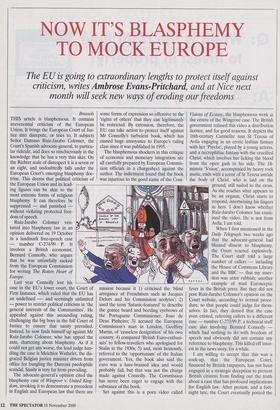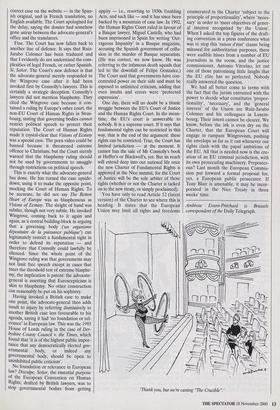NOW IT'S BLASPHEMY TO MOCK EUROPE
The EU is going to extraordinary lengths to protect itself against month will seek new ways of eroding our freedoms
Brussels THIS article is blasphemous. It contains irreverential criticism of the European Union. It brings the European Court of Jus- tice into disrepute, or tries to. It subjects Senor Damaso Ruiz-Jarabo Colomer, the Court's Spanish advocate-general, to particu- lar ridicule, and does so mischievously in the knowledge that he has a very thin skin. On the Richter scale of disrespect it is a seven or an eight, and undoubtedly falls under the European Court's emerging blasphemy doc- trine. This deems that political criticism of the European Union and its lead- ing figures can be akin to the most extreme forms of religious blasphemy. It can therefore be suppressed — and punished without violating protected free- dom of speech.
Ruiz-Jarabo Colomer ven- tured into blasphemy law in an opinion delivered on 19 October in a landmark free-speech case — number C-274/99 P. It involves a British economist, Bernard Connolly, who argues that he was unlawfully sacked from the European Commission for writing The Rotten Heart of Europe.
Last year Connolly lost his case in the EU's lower court, the Court of First Instance, which ruled that the EU has an undefined — and seemingly unlimited — power to restrict political criticism in 'the general interests of the Communities'. He appealed against this astounding ruling, challenging the big boys in the full Court of Justice to ensure that sanity prevailed. Instead, he now finds himself up against Mr Ruiz-Jarabo Colomer, who has upped the ante, chattering about blasphemy. As if it could not get any worse, the lead judge han- dling the case is Melchior Wathelet, the dis- graced Belgian justice minister driven from office for bungling the Dutroux paedophile scandal. Sanity is very far from prevailing.
The advocate-general's opinion cited the blasphemy case of Wingrove v. United King- dom, invoking it to demonstrate a precedent in English and European law that there are some forms of expression so offensive to the `rights of others' that they can legitimately be restricted. By extension, therefore, the EU can take action to protect itself against Mr Connolly's turbulent book, which has caused huge annoyance to Europe's ruling class since it was published in 1995.
The blasphemous shockers in this critique of economic and monetary integration are all carefully prepared by European Commis- sion officials in a chargesheet against the author. The indictment found that the book was injurious to the good name of the Com- mission because it 1) criticised the 'blind arrogance of Frenchmen such as Jacques Delors and his Commission acolytes'; 2) used the term 'Satanic-featured' to describe the goatee beard and beetling eyebrows of the Portuguese Commissioner, Joao de Deus Pinheiro; 3) accused the European Commission's man in London, Geoffrey Martin, of 'ceaseless denigration' of his own country; 4) compared 'British Euro-enthusi- asts' to fellow-travellers who apologised for Stalin in the 1930s; 5) and, most heinously, referred to the 'opportunism' of the Italian government. Yes, the book also said the euro was a hare-brained idea and would probably fail, but that was not the charge made against Connolly. The Commission has never been eager to engage with the substance of the book.
Set against this is a porn video called Visions of Ecstasy, the blasphemous work at the centre of the Wingrove case. The British government refused this video a distribution licence, and for good reasons. It depicts the 16th-century Carmelite nun St Teresa of Avila engaging in an erotic lesbian fantasy with her 'Psyche', played by a young actress, and a necrophiliac fantasy with the crucified Christ, which involves her licking the blood from the open gash in his side. The 18- minute 'Vision', accompanied by heavy rock music, ends with a scene of St Teresa astride the body of Christ, who is laid on the ground, still nailed to the cross. As she reaches what appears to be an orgasm, Christ starts to respond, intertwining his fingers in hers. I don't know whether Ruiz-Jarabo Colomer has exam- ined the video. He is not from Avila, I am told.
When I first mentioned in the Daily Telegraph two weeks ago that the advocate-general had likened dissent to blasphemy, the Court reacted explosively. The Court staff told a large number of callers — including the House of Commons Library and the BBC — that my asser- tion was utter rubbish; another example of mad Eurosceptic fever in the British press. But they did not post Ruiz-Jarabo Colomer's opinion on the Court website, according to normal proce- dure, so that people could judge for them- selves. In fact, they denied that the case even existed, referring callers to a different case — number C-273/99 P, a technical staff case also involving Bernard Connolly which had nothing to do with freedom of speech and obviously did not contain any reference to blasphemy. This killed off inter- est in the news story, for a while.
I am willing to accept that this was a cock-up, that the European Court, financed by British taxpayers, has not been engaged in a strategic deception to prevent British citizens from finding out the truth about a case that has profound implications for English law. After protest, and a fort- night late, the Court eventually posted the correct case on the website — in the Span- ish original, and in French translation, no English available. The Court apologised for the delay, saying the dossier had somehow gone astray between the advocate-general's office and the translators.
Fine. The Court has now fallen back to another line of defence. It says that Ruiz- Jarabo Colomer has been traduced and that I evidently do not understand the com- plexities of legal French, or rather Spanish. Si, Senor. The Court's new defence is that the advocate-general merely responded to the Wingrove case after it had been invoked first by Connolly's lawyers. This is certainly a strategic deception. Connolly's lawyers did not mention blasphemy. They cited the Wingrove case because it con- tained a ruling by Europe's other court, the non-EU Court of Human Rights in Stras- bourg, stating that governing bodies cannot restrict political speech to protect their reputation. The Court of Human Rights made it crystal-clear that Visions of Ecstasy was a special case. The porn video could be banned because it threatened extreme offence to Christians, but the Court sternly warned that the blasphemy ruling should not be used by governments to smuggle through restrictions on political speech.
This is exactly what the advocate-general has done. He has turned the case upside- down, using it to make the opposite point, mocking the Court of Human Rights. To be accurate, he did not say The Rotten Heart of Europe was as blasphemous as Visions of Ecstasy. The sleight of hand was subtler, though not very subtle. He invoked Wingrove, coming back to it again and again, as a central building-block in arguing that a governing body (`un organisme depositaire de la puissance publique') can legitimately restrict a fundamental right in order to defend its reputation — and therefore that Connolly could lawfully be silenced. Since the whole point of the Wingrove ruling was that governments may not limit free speech except in cases that meet the threshold test of extreme blasphe- my, the implication is patent: the advocate- general is asserting that Euroscepticism is akin to blasphemy. No other construction can reasonably be put on his sophistry.
Having invoked a British case to make one point, the advocate-general then adds insult to injury by referring dismissively to another British case less favourable to his agenda, saying it had `no foundation or rel- evance' in European law. This was the 1993 House of Lords ruling in the case of Der- byshire County Council v. the Times, which found that 'it is of the highest public impor- tance that any democratically elected gov- ernmental body, or indeed any governmental body, should be open to uninhibited public criticism'.
No foundation or relevance in European law? Di.sculpe, Senor, the essential purpose of the European Convention on Human Rights, drafted by British lawyers, was to stop governmental bodies from getting uppity — i.e., resorting to 1930s Enabling Acts, and such like — and it has since been backed by a mountain of case law. In 1992, the Human Rights Court ruled in favour of a Basque lawyer, Miguel Castells, who had been imprisoned in Spain for writing 'Out- rageous Impunity' in a Basque magazine, accusing the Spanish government of collu- sion in the murder of Basque separatists. (He was correct, we now know. He was referring to the infamous death squads that led to the downfall of Felipe Gonzalez.) The Court said that governments have con- centrated power on their side and must be exposed to unlimited criticism, adding that even insults and errors were 'protected expression'.
One day, there will no doubt be a titanic struggle between the EU's Court of Justice and the Human Rights Court. In the mean- time, the EU's court is answerable to nobody. It is a supreme court. If it says that fundamental rights can be restricted in this way, that is the end of the argument: these rights can be restricted. True, the Court has limited jurisdiction — at the moment. It cannot ban the sale of Mr Connolly's book at Heffer's or Blackwell's, yet. But its reach will extend deep into our national life once the new Charter of Fundamental Rights is approved at the Nice summit, for the Court of Justice will be the sole arbiter of those rights (whether or not the Charter is tacked on to the new treaty, or simply proclaimed).
You have only to read Article 52 (latest version) of the Charter to see where this is heading. It states that the European Union may limit all rights and freedoms enumerated in the Charter 'subject to the principle of proportionality', where 'neces- sary' in order to 'meet objectives of gener- al interest recognised by the Union'. When I asked the top figures of the draft- ing convention at a press conference what was to stop this 'raison d'etat' clause being misused for authoritarian purposes, there were audible hisses from a number of EU journalists in the room, and the justice commissioner, Antonio Vitorino, let out one of those patronising little laughs that the EU elite has so perfected. Nobody really answered the question.
We had all better come to terms with the fact that the jurists entrusted with the power to decide what constitutes 'propor- tionality', 'necessary', and the 'general interest' of the Union are Ruiz-Jarabo Colomer and his colleagues in Luxem- bourg. Their intent cannot be clearer. We know, before the ink is even dry on the Charter, that the European Court will engage in rampant Wingrovism, pushing the envelope as far as it can whenever our rights clash with the papal ambitions of the EU. All that is needed now is the cre- ation of an EU criminal jurisdiction, with its own prosecuting machinery. Preposter- ous? Last month the European Commis- sion put forward a formal proposal for, yes, a European public prosecutor. If Tony Blair is amenable, it may be incor- porated in the Nice Treaty in three weeks' time.
Ambrose Evans-Pritchard is Brussels correspondent of the Daily Telegraph.
`Thank you, but we're casting "The Crucible".'



































































































 Previous page
Previous page